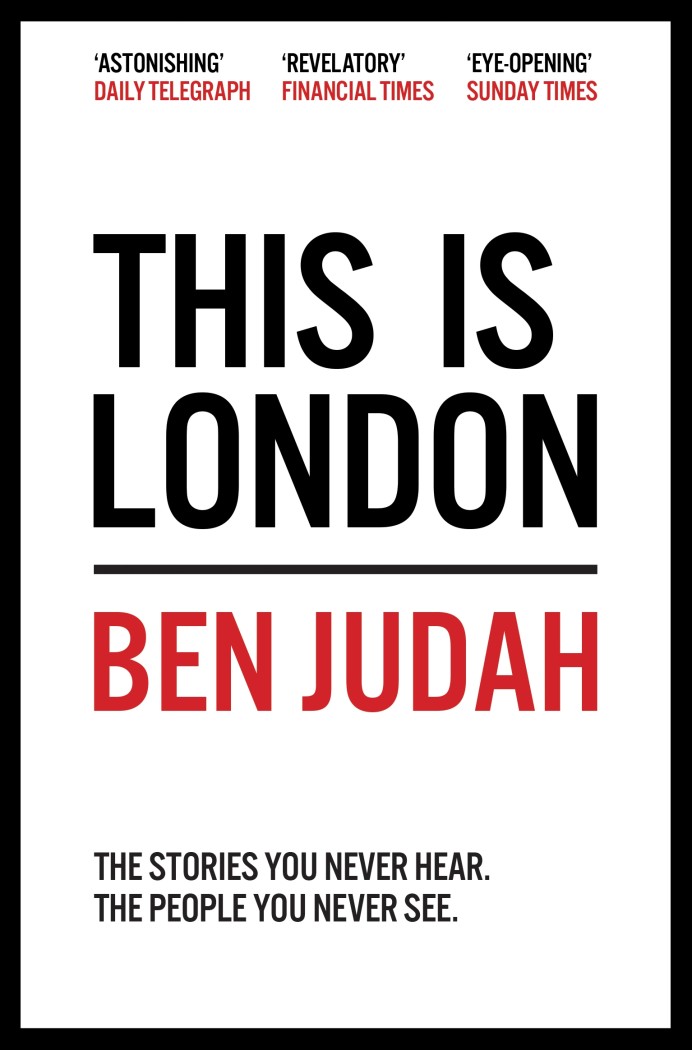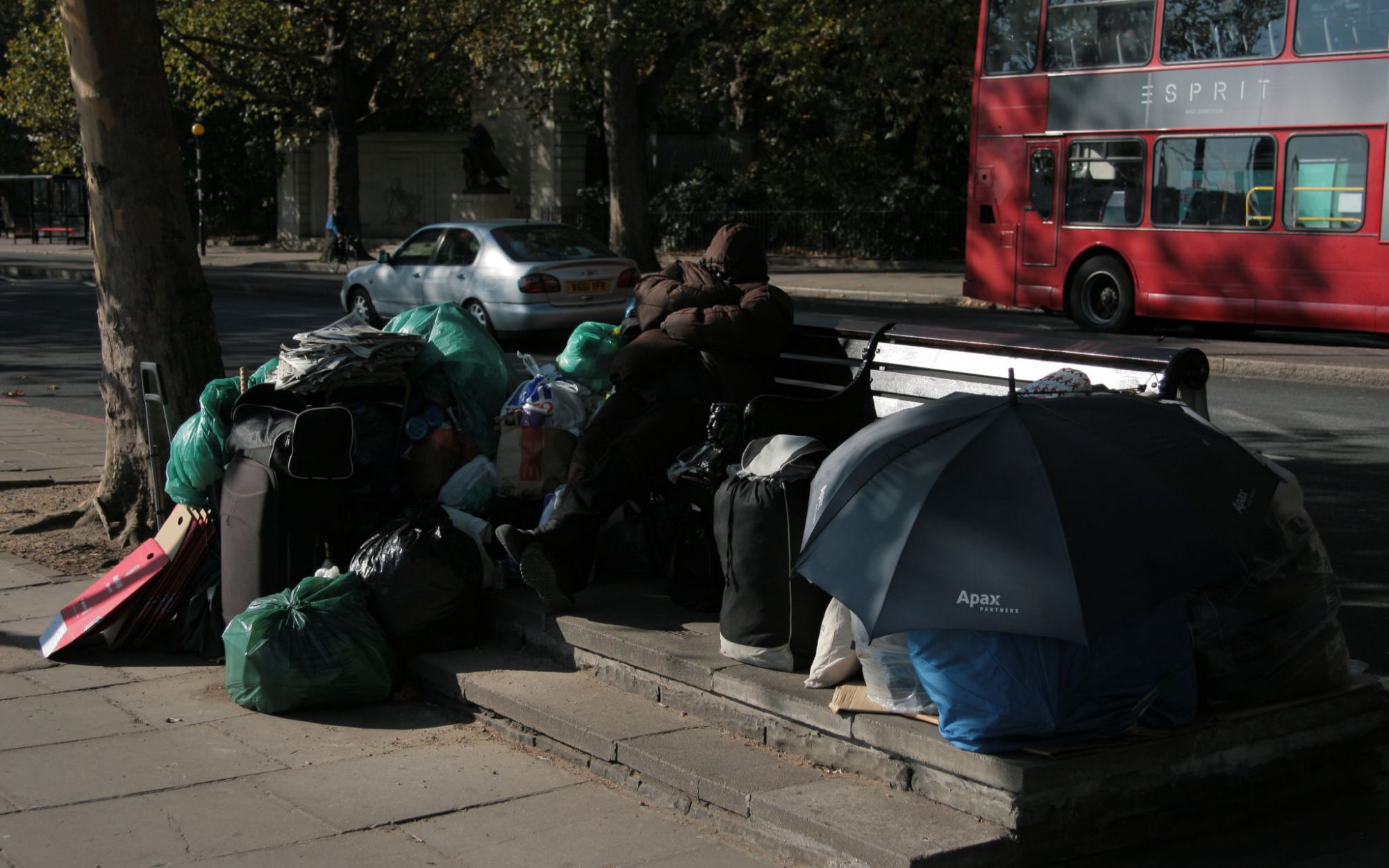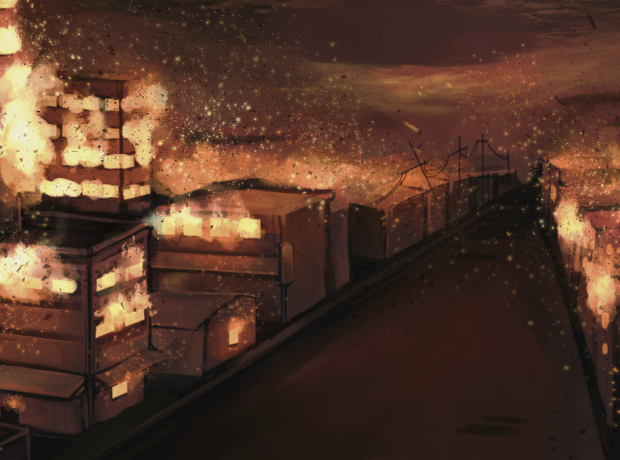‘I was born in London but I no longer recognize this city…a city where at least 55 per cent of people are ethnically white British, nearly 40 per cent were born abroad, and 5 per cent are illegally in the shadows. I have no idea who these new Londoners are. Or even what their London really is.’ Ben Judah, This is London
In 10 years, the population of London will reach 10 million, and many of the city’s new citizens will be immigrants. 57 per cent of new births in the city are to migrant mothers, and 100,000 of those moving to London each year between 2011 and 2015 have come from overseas. In a city in which no street looks as it did twenty years ago, Judah, a foreign correspondent and author of Fragile Empire, is concerned and intrigued by the seismic demographic shifts reverberating across the capital.
In the style of George Orwell’s The Road to Wigan Pier, This is London is a comprehensive mapping of the city and its immigrants by story-telling, as Judah talks to ‘everyone’, drug-dealers, policemen and social workers in order to understand ‘the new London’ and see for himself the fractured pieces of the collection of extremes that is London. In some ways, it is remarkable how little has changed where poverty in Britain is concerned. Orwell described the working class as caught in ‘a sort of deadly net of frustration in which it is harder and harder to persuade yourself that you are happy, active or useful,’ a net also slowly creeping over the ranks of the middle-classes. In London, on the streets of Beckton, of Peckham, of Edmonton Green, Judah encounters the same kind of despair in a hidden city lurking in plain sight and yet utterly invisible to half its population. At one point, ‘a harried African cleaner in Day-Glo, clutching a mop, accidentally thwacks [a French woman’s] shoulder, and apologises. But she hardly registers…like that Day-Glo is on an invisible man.’ This type of encounter plays out again and again, as Londoners serenely ignore those labouring around them.

Image via Pan Macmillan
Judah opens in Victoria Coach Station, an area of prosperity and tourism, walking distance from Buckingham Palace, the Houses of Parliament and Hyde Park. But, seen from the eyes of a journalist pretending to be a homeless Romanian immigrant, Hyde Park, or at least the underpass underneath its grounds, becomes a place marked by fear and urine, inhabited by slaves. Victoria Coach Station is ‘our miserable Ellis Island. The point from which our society is changing.’ Judah’s language is suspended between the lyrical and the crude. People and places are distorted, dystopic versions of themselves; a person is described as a grinning skull covered with skin, only to be revealed by a photo on the next page to be nothing more than an elderly man, with deep crow’s feet. Everyday sights take on a surreal colouring – ‘wheels crash through dirty water as coaches… unload Paris, Bucharest and Rome. Pigeons flutter and ventilators moan.’
This is London relentlessly strips away the gilt of London to reveal the poverty upon which the capital is built
This is London relentlessly strips away the gilt of London to reveal the poverty upon which the capital is built. At a time when Britain has revealed its internal struggles with globalisation and ‘fluxes’ and ‘streams’ of immigrants, London has often been depicted as a beacon of tolerance, where 60% of its voters voted to remain in the EU. Sadiq Khan, in his new position as Mayor, is building his own political momentum from this reputation, spearheading a campaign on the importance of immigrants in the city, titled ‘London Is Open.’ Judah puts a sharp pin in any inflated sense of complacency, by showing just how much you need to ignore to navigate London and not be hugely uncomfortable about the way in which it is structured.
The problems presented by Judah which saturate London are numerous: homelessness; the care sector; gentrification; slums; slavery; mental illness and postcode warfare. Each of these issues is exposed as a gaping wound in the fabric of the city of the disenfranchised. Sometimes, the sheer variety and enormity of the matters Judah explores can be overwhelming, and seem chaotic. But, with emphatic force, he keeps returning with growing anger to the same themes: prostitution, London’s cocaine industry, and the extremity of the inequality of distribution of wealth, asking how capital is distributed in a nation where £10 billion of its GDP can be attributed to the drugs trade and prostitution.
London is built on extremes of wealth and poverty
Much of Judah’s recent work has focussed upon London’s status as the money-laundering capital of the world. With this in mind, it is possible to understand the fury with which he repeatedly picks at the way London is built on extremes of wealth and poverty. The Roma Gypsies whom he interviews in the first chapter, are not only homeless, but enslaved. They are forced to give their meagre earnings from busking and begging to men who are charging them one hundred per cent interest on loans which they will never repay. Surrounded by heroin addicts, dying men and women, one loses his temper completely when a passing woman only gives him coppers. Sleeping on concrete, begging to protect his family from violence from debt-collectors, he is living in a place where filthy water is poured onto the pavements outside shops selling some of the world’s most expensive real estate, so people like him cannot sleep there.
Once wearing the uniform of the homeless amongst the Roma community, Judah is ‘invisible’, except for when passers-by retreat in fear away from the homeless community, or shout abuse. ‘Why do the English hate the Romanians so much?’ another man asks. The general consensus amongst the Romanians is that it is because they were allied to Hitler in the Second World War. However, it is not known for people to scream ‘fuck you’ at Germans in Britain the way they do to the Roma. Judah does not offer any answers, unlike his interviewees. A policeman he speaks to does not trust Romanians; he feels that they are crafty, pretending that they don’t speak English to get out of trouble. In fact, he blames the current crime wave directly on Eastern Europeans. Browsing recent articles from tabloids is a remainder of the stereotype that many are here to claim benefits; one says that a Ukrainian man leapt in front of a car just to demand compensation, whereas the Express has been outraged ‘as UK gives £160 million in child benefit to Eastern Europe.’
London is a city divided by interracial and international hatred
A recurring sentiment in the book is that London is a city divided by interracial and international hatred. Every interviewee has an opinion on another culture, another ethnicity; it is only rich white people who ‘cannot bear’ to talk about race. But most of the people Judah interviews have no such qualms.
‘It’s like this: Russian and Ukrainian people hate Polish and Lithuanian people. Eastern Europe peoples hate Indian people. Everybody hates the black people. Whites hate everyone…That’s just the way it is.’
However, Judah makes increasingly clear that London is not only built around but built upon the people it holds most in contempt. One hundred thousand people are employed in the construction industry in London who are paid below minimum wage (a man interviewed received £5 an hour) and largely from Eastern Europe. As Judah writes, these are the people building David Cameron’s ‘dream of two hundred new skyscrapers’. The country is also predicated on immigrant labour in many other ways; they represent two thirds of London’s carers, ninety-five per cent of the Tube’s cleaners, and ninety-six per cent of the city’s prostitutes. The latter, which is the most at-risk group for murder, also mostly consists of Eastern European women.
The estimate given by Judah of the number of prostitutes in London is seven thousand; an ongoing inquiry held by the Home Affairs Select Committee reckons the true number to be almost five times that number. However, the study Judah cites was conducted in 2003, bringing into question the reliability of the statistics given in the book. But then, it is notoriously difficult to collect hard evidence where the sex industry is concerned; the Parliamentary inquiry has so far yielded few concrete results. The Select Committee has expressed deep disappointment at the lack of reliable information on the issue, although it has recommended, in the interests of safety, immediately lifting the ban on soliciting and ‘brothel-keeping’ (defined as when more than one prostitute is working in the same building).
These women are in constant danger
Judah’s findings show these women are in constant danger. In both the chapters which focus on prostitution, the women can only talk about the other women they know who have been killed in stabbings, from infatuated men high on cocaine, or simply because a man did not want to pay. It is uncertain whether this anecdotal evidence suggests that the real number of women killed in prostitution in the past twenty-five years is really 152, as official figures show, or much higher. Either way, This is London and the inquiry strongly suggest that women who are immigrants are at much greater risk: of the last eleven sex workers killed, nine were immigrants. Non-UK sex workers are paid less too. Sex workers have an average of 25 clients per week paying an average of £78 per visit, which totals almost £2,000 a week. The woman whom Judah interviews in Edmonton Green counts herself lucky to make £500 in the same amount of time.
Some might say that the Home Affairs Select Committee and its inquiry into prostitution have been undermined by the behaviour of its former chair, Keith Vaz. Whether this is true or not, the scarce data available shows that the sex industry is one of many evils which makes women vulnerable in every way possible, and it is essential for those in power to have the safety, dignity and fundamental rights of women as their primary concern.
Those in defence of prostitution have made the argument that sex work is lucrative, allowing women independence and financial freedom. One sex worker, a Romanian woman called Jenny, gives a counter argument:
‘You think we do this job for pleasure? You think us…bitches…can think of anything else…when sometimes we get stab? Of course we are scared…We are scared…We are scared of men.’
Despite the constant fear described by every woman Judah interviews on Fore Street, Edmonton Green, there are around 72,800 sex workers in the UK. Their work is in demand, after all: estimates show that 11% of men in Britain, 2.3 million individuals, have paid for sex on at least one occasion.
If prostitution is an ever-present problem, so too, Judah points out, is cocaine, highlighting how easily the Class A drug can be obtained. An interview with Moses, a highly successful drug dealer, describes single mums used as carriers and ‘rich white folk…nostalgic for the old days. They want you to be respectful, talk nicely to them, they want a big black gentleman.’ Such customers are spending between £10 to 20 thousand a year on cocaine, people whom Moses utterly despises but makes huge profits from. ‘I’m the criminal, but who created me?’ he asks.
London has been called the cocaine capital of Europe
Demand for men like Moses is high. London has been called the cocaine capital of Europe, with consumption so high that its presence has been noted in drinking water. Although it is mostly associated with the high-octane and extravagant lifestyle of the City, the development of the cocaine industry into a two-tier market means that low quality, weaker cocaine, mixed with chemicals such as anaesthetics and animal worming agents, is often sold very cheaply – a line of cocaine can cost between £2-8, meaning that its consumers have diversified. Higher quality powder on the other hand can be as much as much as £120 a gram. The UK needs to import 25–30 metric tonnes of cocaine annually to meet the demand for its cocaine powder and crack market, only 12-14% of which is intercepted by the authorities. It is then distributed by ‘the people it gives the least of a shit about: teenage boys – especially black teenage boys,’ says Judah, people who are demonised for fulfilling the addictions of their clientele.
‘Because this is London: and if you’re not doing drugs you’re fucking sex workers…And I know that behind every rich family in London is a drug dealer…What was the British Empire fucking based on? Drugs: sugar, slaves and fucking opium.’
In the century following the disintegration of the British Empire, Britain continues to both rely upon and demonise its foreign labour in an unequal, prejudiced society. In This is London, multiculturalism in London has failed.
Multiculturalism in London has failed
It cannot be said the government are not trying to deal with the issues that arise from immigration, battling with the conflicted but strident opinions of the media and the public. As I write this article, the Immigration Act 2016 is coming into force, which will penalise anyone housing or employing illegal immigrants, as well as deporting those waiting on their asylum claim, which will put many in risk and further endanger their claims.
Politicians have also grappled with rising public panic as the refugee camp steadily expanded at Calais over the past year. Last summer, I attended an evidence session of the Home Affairs Select Committee, where those testifying were hugely concerned about the rapid changes and increases in global migration. Keith Vaz summarised the evidence given to the former Immigration Minister, James Harrison, as follows:
‘We in no way underestimate the scale of the task at hand in Calais, but we are concerned that there is a sense that the situation there is spiralling out of control. The Deputy Mayor of Calais told me last week that the situation in Calais is like a “civil war”.
‘The security measures at both the ferry and tunnel ports appear to be creaking under the strain of the enormous increase in migrants who have flooded the town in search of a better life in the UK. Fences are not enough. The number of people who have crossed the border illegally to reach Dover via Calais has trebled in the past year and many lives have been lost in the process, including the two tragic cases we have seen in recent weeks.’
The cases in question were two men who had attempted to cross the Channel using the Euro Tunnel. Harrison expressed little sympathy for these cases and few solutions for what had been presented as the onslaught of an oncoming crisis, one of which is currently being implemented: a wall sixteen feet high.
One year later, much has changed, both for the better and for the worse. The camp at Calais has been cleared, the first of the Syrian children promised refuge have crossed our borders, and the membership of the Cabinet and the Home Affairs Select Committee have changed substantially. As of 24th November, the minimum salary for Tier 2 (General) immigrants will increase to £25,000. For graduate trainees, this threshold will be £23,000 and the number of places available to extra-EU candidates has quietly been increased to 20 per company per year. But the panic, and the fear surrounding the global refugee crisis and the effect it could have on England have not diminished. This panic is partly based on the fear of the unknown, of people only glimpsed in newspaper headlines and adverts for charities. Judah repudiates this reliance on external sources for knowledge of our own cities, which has resulted in This is London.
‘I have to see everything for myself. I don’t trust statistics. I don’t trust columnists. I don’t trust self-appointed spokesmen. I have to make up my own mind.’
One criticism which can be levelled at This is London is that it presents a very one-sided picture. Judah gives no success stories of immigration; even those that are rich and privileged seem to be suffering no less than those working on slave wages. It might seem as though he is describing a world in which many readers, who are educated, middle-class, or comfortable, are invisible. This would not necessarily be a bad thing because the primary problem of the people presented is that, away from this book, they barely exist in the public perception.
Occasionally however, the white, the middle-class, the wealthy, are glimpsed: women, middle-aged, drunk and teetering in high heels shrinking away from the Roma beggars; young hipsters gawping into braiding salons as they make their way through Brixton; wealthy bankers pitying their black drug dealers before obliterating their faculties with cocaine. These glimpses are brief and unforgiving. It calls into question the reader’s own behaviour in treating people with dignity, and whether we can afford to respect the humanity of every individual in a global capital. Although Judah prompts himself, and his readers to reach their own conclusions, his work nevertheless sounds a call for London, and the rest of the UK which is affected by its capital’s reverberations, to confront the ugliness of its society, and to do so at a human level. As one interviewee articulates:
‘ “Do you see yourself in a black African mental-health officer?”
He smiles, rubbing his knuckles.
“That’s the question. That’s the critical question. Do you see bits of you in someone else even if he looks totally different from you? If the answer is yes: you are ready for the multiculturalism.” ‘



